- Home
- Michael Chabon
Gentlemen of the Road Page 10
Gentlemen of the Road Read online
Page 10
“We're glad to hear it,” Amram said, “but Zelikman and I have talked it over and come to the conclusion that you can't possibly kill Buljan in his present estate. He is too powerful, too strong, too well protected and too well armed. I understand that you want revenge, Filaq. It is an impulse I know and respect. But it must not be heeded. It must be deferred. Now I can see that you're about to open that big mouth of yours and pronounce the word ‘coward,’ and so I have to warn you that if you offer such a mistaken analysis of my character and that of my friend, who though admittedly prone to brooding and self-doubt is braver than any man I have ever known, excepting myself, I will be under an immediate obligation to kick your narrow pink ass.”
She hugged herself and went to the narrow window, the legs of the leather breeches whispering as she crossed the room. She looked out at the overgrown garden, the rusty red leaves of the grapevines, the steely sky, the smoke of the fires that would not go out. Then she turned back to the partners.
“So we must first find a way to change Buljan's estate,” she said.
“That was our thought,” said Amram.
“We don't claim to understand this doubled kingship that you live under,” Zelikman said. “It strikes us as overelaborate.”
“It strikes me as stupid,” Amram said. “Correct me if I have it wrong. As far as I can tell, the bek runs the country, and the army, and the treasury; but the kagan runs the bek.”
“The kagan rarely speaks,” the girl said. “But when he does his word is sacred. Inarguable. Absolute.”
“That's the man we want to see,” Amram said.
CHAPTER THIRTEEN
ON SWIMMING TO THE LIBRARY AT THE HEART OF THE WORLD
Across a river frozen to the depth of a planted spear, along an avenue of blazing torches, drawn by reindeer in a royal sledge with fittings of mica and electrum, accompanied by ram's-horn blasts and harness bells and the scrape of iron runners against the ice; tender contraband, hidden at her father's side in the grandiose reek of a bearskin, with the heat and the weight of him against her and the full moon hanging minted against the sky like a bright dirham: that was the way she had last crossed over to the island of the kagan and the palace where he dwelt in friendless splendor. Now she crossed in utter dark, swimming the river at the last hour of night, naked and freezing, preserved from drowning only by the saving company of gentlemen of the road fated someday to be hanged. Greased with tallow, sidearms strapped to their backs, their clothes tied around their necks in bituminized bladders, huffing, gasping. The river in autumn still flowing swift and in its motion burning colder than ice. When she first slipped into the water on the Khazaran side she felt panic, iron bands and deadweights on her chest and ankles, and then numbness like a toxin in her muscles, a fatal resignation. And then Zelikman's hand reaching for her, dragging at her wrist, shoulder, hair, his voice at once harsh and tender hissing, Swim you lazy bitch.
At the southern tip of the island that was shaped like a letter qof they splashed up a stone embankment and clambered stiff and stumbling like unarticulated iron beings. Unslinging their sacks, they rolled in the grass and shadows of a laurel grove in which, so her father had told her, a kagan new-crowned was forced to his knees and informed, with his neck in the loop of a silken garrote, of the precise day and hour on which he would be returned to the spot and dispatched, by a slipknot, to the afterlife of kings.
Cold humming in her, she dressed hurriedly and led Amram and Zelikman up out of the grove and along the scarp toward the southern or Bee Gate. A peacock screamed. The river rang and chuckled. On the right bank they could see the infernal orange of burning houses, and outlined against the glow the sleeping black cat of a mosque. Beyond the scarp rose a flight of broad stone stairs called the Bee Steps, and then they struck the south gate, stout timbers set into an arch in the circular wall, a massive thing of Byzantine plan promising impregnability but untested by war or engine in all the long years of peace.
Into the massive oak portal a man-size door was cut, and it was through this that the guardsmen charged with defending the gate passed to stand their watches. They were six stout Colchian Guards, black-armored, spread out around the door in the gate. Stamping their feet, asleep with their eyes open, dour mountaineers married to silence and solitude. In her mind she sketched the path that she would cut, if she had to, if she could, if only they would let her, she and her borrowed inferior sword, swinging the blade, whirling, lunging, a zigzag path like the lacing of a buskin. But her life and her actions were never her own and never had been from the first hour of her consciousness and so she left the sword in its scabbard and watched, scowling, as Zelikman, wrapped in black from head to toe, crept up behind the Colchians one by one and fed them through the nostrils one of his magical drafts. They sank to their knees with audible sighs like cursed men released from a spell. She followed Amram out of the shadows and watched impatiently as he used the edge of Mother-Defiler to prize open the door in the gate.
She had always found a paradox in the crime of blasphemy for it seemed to her that any God who could be discountenanced by the words of human beings was by definition not worthy of reverence, but even to pass through the Bee Gate into the Alley of Bees was a terrific profanation and perhaps it was the lingering chill of the river in her bones but she thrilled with her first few steps.
They were surprised at the next gate by a huge Turkoman who came out of nowhere, the skin of a tiger knotted by its paws around his shoulders, and lunged at Amram with a steel lance. It passed through the quilting of Amram's bambakion and struck the mail he wore underneath with a muffled spark like a lamp flickering behind a curtain. She flung herself onto the Turkoman's back and with the rank bacon smell of his oiled hair in her nostrils bit off his ear, a salt apricot between her teeth. She had her thumbs in the Turkoman's eye-sockets but before they could know that burst of hot immersion Zelikman was there with his reeking rag and the man drained to the ground like sand running out of an hourglass.
Zelikman shook his head, wearing a look of reproach, and in answer she spat the hunk of ear at his feet and kept on walking, aware as she moved forward of a rushing in her head like a swell of fervent chanting, a wobble in her ankles. She could feel the green tendrils of the sleeping draft twining up the doorposts of her mind. She listed to the side and slammed her shoulder against a stone pillar. Amram caught her and set her on her feet, and Zelikman laid his cold fingers along her temples, and she came to herself But the remainder of the journey to the apartments of the kagan partook of the labyrinthine tedium of a dream, and she was never afterward able to recall it, or to say how, in the darkness, with her last visit to the palace having occurred in her girlhood, with her mind disordered by the draft and the iron flavor of blood in her mouth, she managed to conduct the thieves, with accuracy and haste, to the heart of the heart of her world.
It was just as she remembered it, as in her dream, as in any dream: a circular brick tower on a miniature islet of brick, in a glossy black moat, within a ring of laurels, at the center of a vast courtyard of cyclopean flagstones, at the very midpoint of the city of Atil and the Palace of the kagan. Imposing and forlorn, a grave marker, a dolmen, the eyrie of some august raptor. At the top four timbered loggias each carved with the totem animal of the direction it faced (raven, dove, bee, heron); at the base a narrow doorway. Here four more Colchians stood guard and here Zelikman found that he had run out of narcotic elixir, so that to gain entrance the partners, showing the same maddening restraint they seemed to feel was incumbent upon them as her “guardians” now that she had been exposed as a female, albeit one who would in a transport of impatience chew off a man's ear, were obliged to employ the haft of the ax, the flat of a sword and an admittedly impressive display of simple pounding with fists and boot heels.
A commotion was therefore unavoidable, and by the time they had wound, like the ant of Daedalus threading the conch, up the involute stairway to the highest chamber in the city of Atil, the kagan was on his
feet and waiting for them, wearing a hard little smile, as if the whole adventure from the meeting with the partners at the caravanserai until now, as if all that slaughter and struggle had been arranged beforehand or at least foreseen by this tall, fat man with the cropped hair and the beard close-trimmed over pitted jowls and the eyes so mournful, tender, pitiable and pitying that she could not meet them.
“The little mouse,” he said.
Grief swelled her chest and throat as if the iron bands of the river had finally snapped. The kagan opened his hands and turned them palm upward as though testing for rain. Waiting for her. And though no one had touched him or even looked him in the eye in thirty years she went to him, and after a moment of uncertainty he transgressed all laws and took her stiffly in his arms, and in a whisper he called her by the name that apart from her brother he alone now knew out of all the men and women on the face of the earth.
It was a while, a longer time than they could afford, before she could arrest the sobs that shook her, draw her sword and lay the point of it against one of the luxuriant folds of his throat.
“Buljan dies or you do,” she informed him.
“Show some ambition, little mouse,” the kagan said, looking not at the blade but into her eyes. “Why settle for one or the other?”
“Girl,” Amram said. “Lower your sword.”
She dipped the tip of the blade to the kagan's belly and then returned it to the scabbard slung across her shoulders. Zelikman had his back to all of them, stalking a long shelf of folios and scrolls with his fingers flickering at his sides as if he longed to touch them. Apparently he had no particular interest in meeting or even noticing one of the three princes acknowledged as a peer by the Emperor of Byzantium, along with the Emperor of the Franks and the Caliph of Baghdad.
“We're marked,” she said. “Hunted.”
“I know,” the kagan said.
“I've lost everything.”
“I know it, little mouse.”
He pointed to the only seat in the room, a low couch covered in dappled ponyskin. She shook her head.
“These two … “
“Have nothing to lose?” He spoke in the holy tongue. “Amram, isn't it? An Abyssinian. I am pleased. I have never seen an African in the flesh before.” Amram touched his forehead. “I perceive that you served in the army of my brother emperor. I have heard a good deal about that ax you carry Tell me, have you ever used it to shave the throat of one of the princes of the earth?”
Amram shook his gray head. “Only a petty one,” he said. “A minor khan or two.”
The kagan looked delighted by this information. He turned to Zelikman and spoke a careful sentence in an outlandish tongue. Zelikman replied in the same language, lightly, then spun around, the yellow curtain of his hair flying. He stood for a moment blinking at the kagan. Then he swept the pretty embroidered hat from his head and bowed low
The kagan conversed with him a little in the language of Zelikman's unimaginable homeland, a dense jargon that seemed to her to be pronounced with the front and the back of the tongue at the same time, and with the lips simultaneously pursed and opened wide. Then he went to the shelf and took down a large vellum book and handed it to Zelikman.
“The De Urines of Alexander Trallianus!” Zelikman said. “But it was lost.”
“Imperfectly”
Zelikman took the book with reverence and set it on a lectern and started to turn its pages, and she supposed that they had lost him now for a long time.
“So you know a lot,” Amram said. “Do you know what this girl wants, and how she can get it?”
“That depends. Do you want to be the bek, little mouse?”
She shook her head. “I knew it would not work,” she said. “So in my heart I never desired it. Not for myself For my brother, yes. For Alp. And I still want to drive Buljan from the tripod, and hold it for Alp until he can be ransomed or liberated. And then we will see to the Rus. And if a woman may not be bek there is no law, so far as I know, to prevent her from becoming a tarkhan. I have already proved that I can lead soldiers into a fight.”
“Your brother,” the kagan said. “Alp. That's another thing, alas, that I know something about.”
“He is not dead,” she said. “No. No, he isn't.”
“The Rus encountered a plague when they reached Derbent,” the kagan said. “Or perhaps the plague was booty they acquired along the way south. They may even, I do not know, have brought it with them out of the North. Some illnesses lie hidden in the body like burrs in a fold of a cloak, for days and weeks and even months, before they flower.”
Filaq remembered how her brother looked on the summer day she last saw him, tall and gangly, speaking tenderly to the falcon on his arm, as he rode to hunt at their family's horde amid the plane trees and the cicadas and the wild surge of grapevines in the hills. She looked away so that they would not see her tears, and noticed, on its carved and gilded stand, the giant illuminated Ibn Khordadbeh that had so enchanted her as a child, with its maps and preposterous anatomies and flat-foot descriptions of miracles and wonders, page after page of cities to visit and peoples to live among and selves to invent, out there, beyond the margins of her life, along the roads and in the kingdoms.
“I will help you,” the kagan said. “Because I was fond of your father, at least to a point, and even more because I have always been fond of you. There is nothing now that I can do to help your brother, least of all seat him on the tripod. But I can order Buljan to abdicate. I am a prisoner of my title. But so, though he has yet to be forced to acknowledge it, is he.”
“The man wiped out the family of this girl,” Amram said. “He executed five hundred of the kaganate's finest troops, mowed them down in cold blood. I suppose I don't need to tell you that.”
“True enough,” the kagan said.
“It strikes me that conceivably he might therefore behave in whatever way suits his purposes best,” the African said. “Regardless of what you tell him to do.”
“The bek may not disobey the kagan.”
“That is true,” she told Amram. “We have had revolution and coup and civil war now and then in our history But that is one thing we have never had.”
“He ignored your own flag of truce,” Zelikman said.
“True, and yet I think he will go,” the kagan said. “Palace life does not hold the appeal for Buljan that he imagined it would. But first, you see, I must be persuaded to order him to go.”
“And what is it going to take to make that happen?” Zelikman said.
“It's really quite simple,” the kagan said. “I just want you to kill me.”
A silence ensued, during which the partners conferred wordlessly, stroking their chins while she watched, fidgeting and stalking the circular room, wanting to look at the book she had loved but afraid that if she did she would never be able to live with the paltry self that fortune had chosen for her.
“We can do that,” Amram said to the kagan.
“We can?” Zelikman said, looking less startled than interested by his partner's claim.
“Of course. I already beat Buljan once at shatranj with the sacrifice. I hate to waste such a fine chance of doing it to him again.”
CHAPTER FOURTEEN
ON THE MELANCHOLY DUTY OF SOLDIERS TO CONTEND WITH THE MESSES LEFT BY KINGS
After a hasty mutual debriefing, the guards, groggy and sheepish and lacking a full complement of ears, roused an old Wendish manservant and sent him into the tower to find out the worst. The Wend, sightless and mute, knew the proper smells and bodily utterances of his man and the circular echoes of the apartment so well that on reaching it he could hear the books that had been moved from their right places, and his sapient nostrils at once discerned the intrusive brackish smell of river water and a faint ribbon of some rank attar in the air. He covered his face with his hands and sank to the floor by the couch that was covered in the hide of a spotted tarpan, and silently wept. He had been born a bondsman into a family of
slaves, and his life was bondage, and in that regard he counted himself no worse than the general run of humanity, not excluding his master, who was the slave of an exacting God and in this nowhere near so fortunately owned as the Wend.
After a little while the Wend got up and wiped his face on his sleeve, and made a study of the angles, likelihoods and protocols of the business at hand. He dragged a Tabriz carpet from the floor and, with a muttered apology, threw it over the mass whose smell of bitter asphodel and silent bulk freighted the couch. He tucked one end of the carpet under this side of the body, careful not to allow even the tips of his fingernails to brush against the flesh, lest he be pursued through the fogbound eternity of his Wendish ancestors by the misplaced and revenging shade of his master, heaved the great bulk to the floor and rolled the dead emperor up in the Tabriz rug, leaving a long flap at the head and feet to facilitate lifting.
While the soldiers worked the body down the spiral stair, the Wend made the long, slow ascent to the turret, carrying a leather pouch tucked under his arm. When he reached the top and stood in the wind he took out a triangular white flag marked with a red rune, unfolded it and hoisted it from the standard, beneath the candelabrum flag of the empire; and thus, against a bright gray sky, with the first fat flakes of snow drifting all around, was the news published to the world that Zachariah, the kagan of the Khazars, had been the victim of a foul assassination.
This faithful Wend was the one who, woken earlier in the night by an urgent pealing of his master's bell, had conveyed from the tower apartment to the quarters of the messenger corps three sealed copies of a written fiat, to be delivered at once to the bek, to the kender and to the grand rabbi of Atil. The couriers sent to the central barracks where the kender was quartered and to the home of the grand rabbi discharged their commissions and returned to their billet in the Palace, but the messenger charged with bringing Buljan the demand for his immediate abdication had a more difficult job, and by the time he tracked Buljan down, on the low reddish hill called Qizl at the southern extreme of Atil, it was nearly the third hour after dawn, and by then Buljan had other concerns.

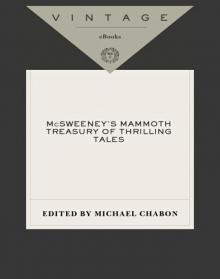 McSweeney's Mammoth Treasury of Thrilling Tales
McSweeney's Mammoth Treasury of Thrilling Tales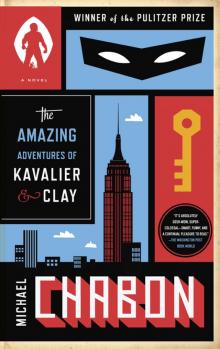 The Amazing Adventures of Kavalier & Clay
The Amazing Adventures of Kavalier & Clay The Yiddish Policemen's Union
The Yiddish Policemen's Union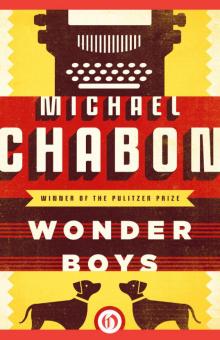 Wonder Boys
Wonder Boys Manhood for Amateurs
Manhood for Amateurs Kingdom of Olives and Ash: Writers Confront the Occupation
Kingdom of Olives and Ash: Writers Confront the Occupation Gentlemen of the Road: A Tale of Adventure
Gentlemen of the Road: A Tale of Adventure A Model World and Other Stories
A Model World and Other Stories Pops: Fatherhood in Pieces
Pops: Fatherhood in Pieces McSweeney's Enchanted Chamber of Astonishing Stories
McSweeney's Enchanted Chamber of Astonishing Stories Summerland
Summerland Telegraph Avenue
Telegraph Avenue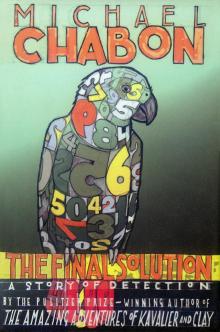 The Final Solution
The Final Solution The Mysteries of Pittsburgh
The Mysteries of Pittsburgh Werewolves in Their Youth
Werewolves in Their Youth Bookends
Bookends Fight of the Century
Fight of the Century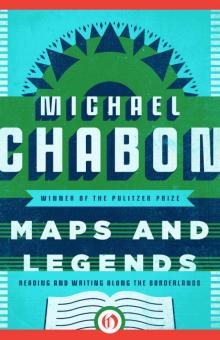 Maps and Legends
Maps and Legends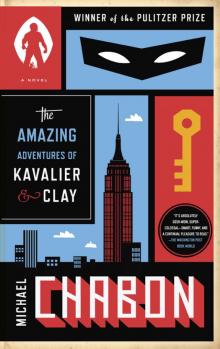 The Amazing Adventures of Kavalier & Clay (with bonus content)
The Amazing Adventures of Kavalier & Clay (with bonus content) Kingdom of Olives and Ash
Kingdom of Olives and Ash Pops
Pops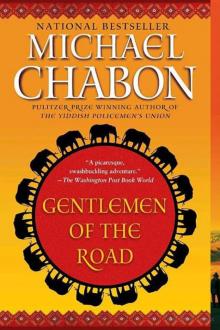 Gentlemen of the Road
Gentlemen of the Road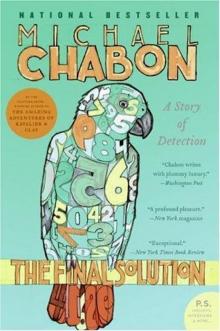 The Final Solution: A Story of Detection
The Final Solution: A Story of Detection Telegraph Avenue: A Novel
Telegraph Avenue: A Novel